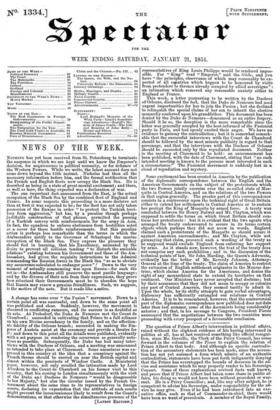Some excitement has been created in America by the ,publication
of the diplomatic correspondence between the English and the American Governments on the subject of the protectorate which the two Powers jointly exercise over the so-called state of Mos- quito in Central America, and on the relations of the two Powers in that region generally. The greater part of this correspondence consists in a controversy upon the technical right of Great Britain either to extend her settlements in Central America or to sustain her protege the King of Mosquito by armed force. A treaty was concluded between Sir Henry Bulwer and Mr. Clayton, which was supposed to settle the terms on which Great Britain should con- tinue her protectorate : but it is evident that the two agents who arranged the treaty endeavoured to secure in its terms certain objects which perhaps they did not avow in words. England claimed such a protectorate of the Mosquito as should secure it against American encroachments ; and Mr. Clayton, while not gainsaying that claim, procured such a wording of the treaty as he supposed would exclude England from enforcing her support by arms. As it stands now, however, the text of the treaty does not comprise any such prohibition ; and in the discussion of the technical, points of law, Sir John Harding, the Queen's Advocate, evidently has the better of Mr. Reverdy Johnson, Attorney- General at the time of the treaty. The claim of America to restrict the extension of English settlement originates in the Monroe doc- trine, which claims America for the Americans, and denies the right of any monarchical state to extend its territories on that continent. Our Ministers have never accepted that doctrine ; but by their assurances that they did not mean to occupy or colonize any part of Central America, they seemed tacitly to admit it. Upon the whole, by its shifty attempts to gain verbal advantages, diplomacy has sufficiently entangled our relations in Central America. It is to be remembered, however, that the controversial part of the diplomatic correspondence now published does not date later than last summer, some of the documents being considerably anterior ; and that, in his message to Congress, President Pierce announced that the negotiations between the two countries were proceeding with every prospect of a favourable conclusion.


































